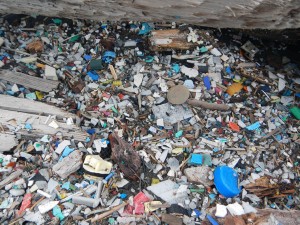
U.S. Sen. Dan Sullivan chaired a hearing in Washington this morning on marine debris, and he asked the witnesses if there was consensus on what the focus should be.
“Is everyone in general agreement on that?” he asked the panel of experts he assembled. “Plastics?”
Saying it, Sullivan said he felt like he was in that 1960s movie, “The Graduate,” where a young Dustin Hoffman is advised to take a promising career path: “I just want to say one word to you. Just one word …. Plastics.”
But rather than a symbol of our country’s bright economic future, plastics at this hearing played the role of villain.
The top Democrat on the Environment subcommittee Sullivan chairs, Sheldon Whitehouse of Rhode Island, showed photos of dead seabirds with bellies full of plastic lighters and other trash. But Whitehouse did a double-take as Chris Pallister, co-founder of Gulf of Alaska Keeper, described the enormity of his group’s task on one location: Montague Island.
“We have 10 people out there working. We have to move them with helicopters, so you can imagine the cost,” Pallister said. “And this is a shoreline where 30 tons of plastic debris per mile exists …”
Whitehouse cut in: “Sorry, did I hear that right?
“Thirty tons of plastic debris per mile,” Pallister confirmed. “Montague has 74 miles of shoreline just like that. We’ve been working on it for three summers now and we’ve only cleaned 9 miles of it.”
Not to mention the other thousands of miles of Alaska coast. Pallister says there’s no steady funding for cleanup work. He says he’s particularly worried about what happens to plastic as it fragments in the ocean.
“Chemicals like phthalates that are put in the plastic to make it soft and pliable … are not very strongly bonded to the plastic and they leach out very easily,” Pallister said.
“Well, this could come home to roost in Alaska salmon,” Whitehouse said. Pallister agreed.
Other witnesses said five developing countries are responsible for more than half of the world’s plastic ocean debris: China, Indonesia, the Philippines, Vietnam and Sri Lanka. Sullivan says he’s looking for ways the U.S. can work with other countries to stem the flow of land-based trash washing into the ocean.
Pallister says he says a great deal of plastic from the commercial fishing industry, including nets, fish totes and buoys. He also says the government should also hold shippers financially responsible for containers they lose at sea.
“Nobody’s talking about getting recovery for the plastics that are going to be coming out of those containers for generations, and it’s something that ought to be explored,” Pallister said.
Liz Ruskin is the Washington, D.C., correspondent at Alaska Public Media. Reach her at lruskin@alaskapublic.org. Read more about Liz here.





